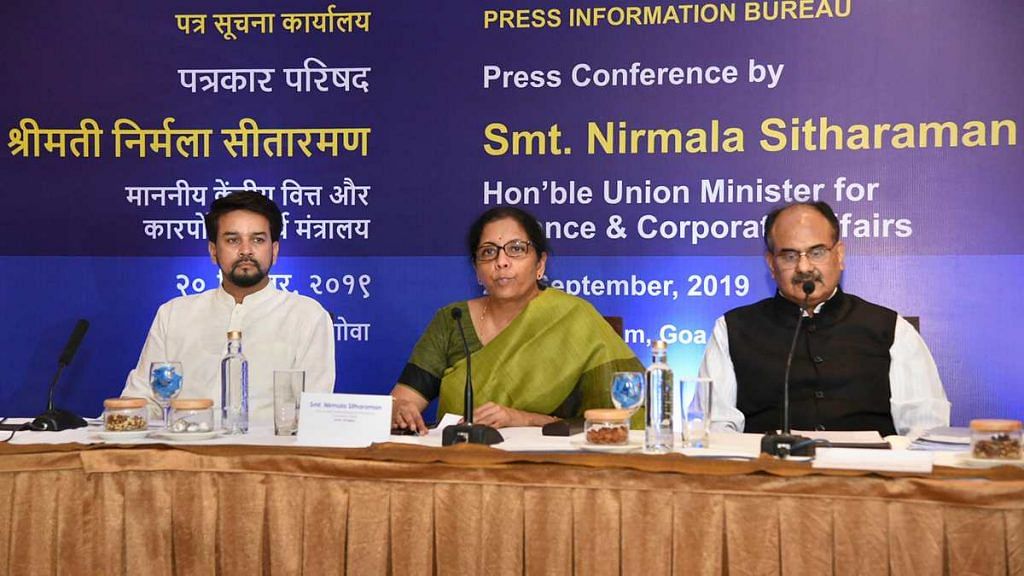New Delhi: The Narendra Modi government has lowered tax rates to 22 per cent for existing companies, and 15 per cent for entities commencing activity in the manufacturing sector — a major fiscal stimulus that is likely to give a boost to the economy amid the ongoing slowdown.
The move is expected to spur investment and help in employment generation.
The changes have been brought through an ordinance, Finance Minister Nirmala Sitharaman said at a press conference Friday, bringing Indian tax rates on a par with those in other major countries.
The effective tax rate will now be 25.17 per cent and 17.01 per cent for existing companies and new manufacturing firms, respectively, provided that they do not claim any exemption under the income tax act.
The effective tax rates have been lowered by around 10 percentage points for both existing and new companies. Earlier, tax rates for large corporates was 30 per cent, and 25 per cent for new manufacturing companies.
Cost to exchequer
The minister also further rolled back the super-rich surcharge levied on foreign portfolio investors and lowered the rate on minimum alternate tax (MAT), the levy meant to reduce ‘tax avoidance’ by companies, to 15 per cent from 18.5 per cent.
All these tax concessions will cost the exchequer Rs 1.45 lakh crore annually.
When asked whether the government will manage to achieve its budgeted fiscal deficit target of 3.3 per cent for 2019-20 after the tax sops, Sitharaman said the measures will result in tax buoyancy and an expansion of tax base, adding that the government is conscious about the impact on the fiscal deficit.
Market participants welcomed the announcement.
“In a major boost to revive flagging animal spirits and (to) position India as one of the most attractive business destinations, the government of India has announced a slew of measures that would act as a force multiplier for the flagging economic engine,” said Ajay Bodke, CEO & chief portfolio manager (portfolio management services) at Prabhudas Lilladher Pvt Ltd
He said the reduction in corporate tax rates will ensure both FDI and portfolio flows into the country.
Corporate India welcomed the move as well.
Kotak Mahindra Bank CEO Uday Kotak said the reduction in tax rates will allow Indian companies to compete with lower tax jurisdictions like the US.
“It signals that our government is committed to economic growth and supports legitimate tax abiding companies. A bold, progressive step forward,” he posted on social networking website Twitter.
Reducing corporate tax rate to 25% is big bang reform. Allows Indian companies to compete with lower tax jurisdictions like the U.S. It signals that our government is committed to economic growth and supports legitimate tax abiding companies.A bold, progressive step forward.
— Uday Kotak (@udaykotak) September 20, 2019
Equity markets zoomed after the announcement. The benchmark Sensex was up 5.4 per cent points and was trading at 38,000 at 12.10 pm.
The fine print
Aimed at promoting growth and investment, the new tax proposal allows any domestic company to avail of a tax rate of 22 per cent if they do not claim any exemptions. They will also be exempt from paying MAT — the effective tax rate for such companies will be 25.17 per cent, inclusive of surcharge and cess, as against 34.9 per cent at present.
To attract fresh investment in manufacturing and provide a boost to the Modi government’s ‘Make In India’, the tax rate has been kept at 15 per cent for any new domestic company incorporated on or after 1 October 2019 that makes fresh investment in manufacturing.
The effective tax rate will be 17.01 per cent, inclusive of all surcharge and cess, provided they do not avail of any exemptions. These companies will also not need to pay MAT.
However, these companies need to commerce production on or before 31 March 2023.
Companies that want to continue to avail of exemptions can move to the new tax regime on the expiry of their exemptions or tax holiday.
Super rich surcharge further rolled back
Sitharaman also further relaxed the controversial super rich surcharge announced in this year’s Budget, in “order to stabilise the flow of funds in capital markets”.
The enhanced surcharge shall not apply on capital gains arising from sale of shares in a company or a unit of an equity-oriented fund or a unit of a business trust liable to securities transaction tax (STT), she said.
Enhanced surcharge will also not apply to capital gains arising from sale of any securities, including derivatives in the hands of the foreign portfolio investors, she added.
Also, tax will not be applicable on the buyback of shares for companies that had already announced such a move before the budget announcement.
Separately, the government has also decided to expand the scope of corporate social responsibility (CSR) spending to include incubators funded by central or state government or any state-run agency.
